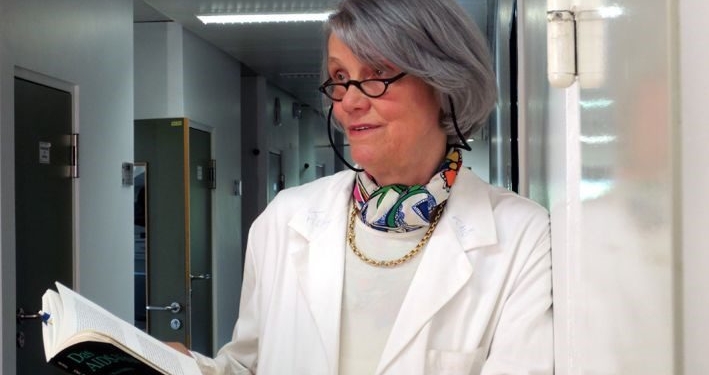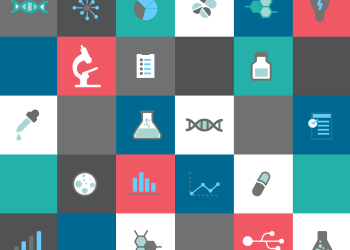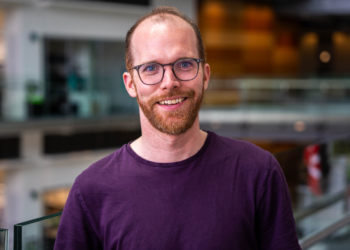Karin Moelling writes about a career-defining day in 1980, when “like a flash of lightning” she realised her team had obtained a “universal” monoclonal antibody against many oncogenic proteins.

24 September is World Cancer Research Day, which raises awareness of the important and lifesaving work done by researchers. As part of this the EACR asked a variety of members to share a day in their life as a cancer researcher.
Name: Karin Moelling
Nationality: German and Swiss
Place of work: Institute of Medical Virology, University of Zürich, Switzerland & Max Planck Institute (MPI) for Molecular Genetics, Berlin, Germany
Job title: Director and Professor of Institute
How long you worked there: 17 years at the MPI (1976-1993); 15 years in Zürich (1993-2008); 2008-present post retirement at both locations

In October 1979, I organised an EMBO course called “RNA Tumor Viruses – A laboratory course in advanced techniques” at the Max Planck Institute for Molecular Genetics in Berlin. Twenty students from all over Europe participated in learning about modern molecular biology in tumor virus research. At the time, I was a group leader at the Institute. Preparations for the course kept my group so busy that we almost regretted the task.
Dominique Stehelin introduced us to hybridization. Anton Berns gave lectures. A Danish colleague, Mette Strand and Tom August, both of whom were working at John Hopkins in Baltimore, introduced the students to the technique of making monoclonal antibodies, a mere four years after their discovery. One of my coworkers, Irene Wilke, was the tissue culture expert in my group. We infected mice with the chicken Rous Sarcoma Virus and wanted to make monoclonal antibodies against its oncogene protein Src.

We isolated the spleens of the immunized mice, fusing them with myeloma cells to immortalize them as “hybridomas”. What followed was a hot summer isolating clones and then testing them. Finally, we injected the clonese cells into mice to grow ascites and gather large amounts of antibodies – something which is now forbidden. Then, we used the monoclonal antibodies for indirect immunoprecipitation and tested the precipitates on a polyacrylamide gel looking for the specific antigens recognized by the monoclonals. There was no Src- protein – a big disappointment. The antibody only detected the Gag protein of the chicken tumor virus.
Then the moment, the moment I will never forget. It was a like a flash of lightning, when I realized that we had obtained a “universal” monoclonal antibody against many oncogenic proteins, albeit in a different and unexpected way. Retroviruses take up cellular genes at the expense of their own replicating genes losing the Reverse Transcriptase. A selection of these recombinant viruses by focus formation in tissue culture led to the discovery of many oncogenes. They were fusion proteins with Gag, such as Gag-Myc, Gag-Mil, Gag-Myb, Gag-ErbB2, etc.

It was clear to me within seconds that we could isolate all of them with this single monoclonal antibody. And we did. We characterized the monoclonal antibody and published it a year later in 1981. My coworker, Peter Donner, designed an immuneaffinity column, the first of its kind, and we purified several fusion proteins to homogeneity. Gag-Myc was shown to be a nuclear DNA-binding protein and, later, a transcription factor. The Gag-Mil protein turned out to be a ser-thr-specific kinase, whilst all other oncogenes were tyr-kinases. We confirmed it to be the analogous mammalian Raf protein with an antibody by Steve Oroszland, handed over to me by Ulf Rapp from Frederick, USA. Rapp became a co-author without Steve or myself knowing about this transaction for years. We confirmed the kinase by site-directed mutagenesis.
In 1999, we pubilshed two Science papers about the dual face of the Raf kinase as the driver of cancer, or differentiation by either growth promotion or growth inhibition, dependent on the cell system. The Raf kinase is the key molecule and cancer target in the MAP-kinase pathway: Ras-Raf-MEK-ERK. Three drugs developed by big pharma for the clinical management of tumor patients took 30 years. They have to take into account our predicted dualism of the Raf kinase, which can exacerbate tumor growth if inhibited, which was unexpected for an oncogene, and it requires additional inhibition. Cancer patients now benefit from several anti-Raf drugs.
This monoclonal antibody established my career as a cancer researcher.
About the Author

I was trained as a nuclear physicist, however I changed fields during a stay at the University of California, Berkeley, in 1969. My PhD at the MPI of Virology in Tübingen was about the replication of retroviruses. Then, I worked as an independent group leader at the MPI, as well as a Director and Professor in Zürich where I continued my research on oncogenes, retroviruses such as HIV, and teaching. I was also in charge of viral diagnostics for the University Hospital in Zürich. Following my retirement, I wrote books at the Institute for Advanced Studies in Berlin and Princeton. I am now working on viruses of resistant bacteria.









